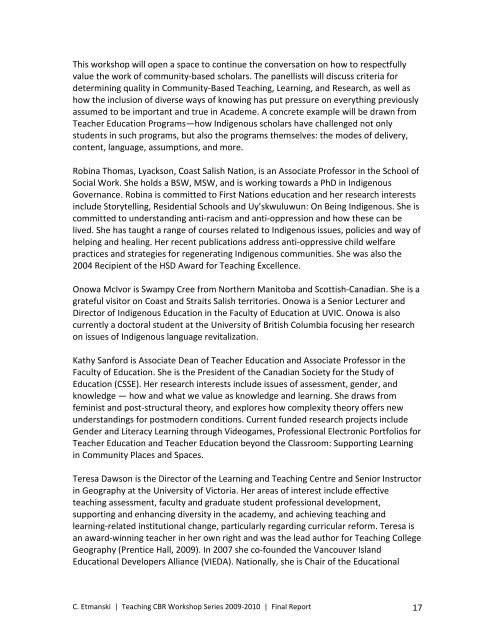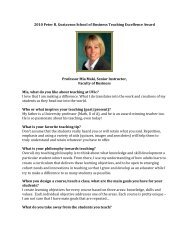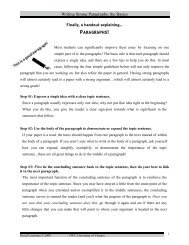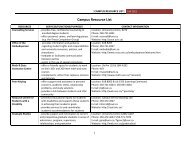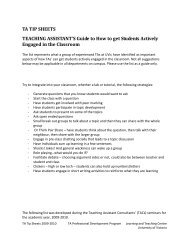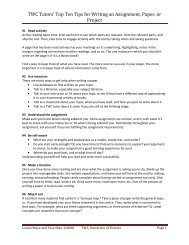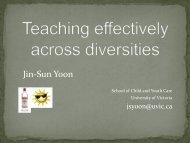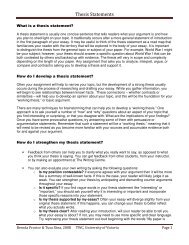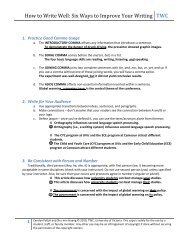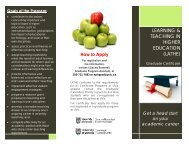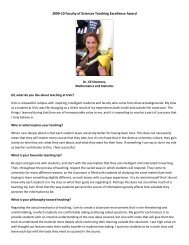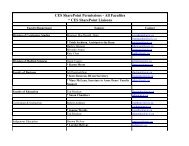C. Etmanski, Teaching CBR 2009-10 Workshop Series Final Report
C. Etmanski, Teaching CBR 2009-10 Workshop Series Final Report
C. Etmanski, Teaching CBR 2009-10 Workshop Series Final Report
- No tags were found...
Create successful ePaper yourself
Turn your PDF publications into a flip-book with our unique Google optimized e-Paper software.
This workshop will open a space to continue the conversation on how to respectfullyvalue the work of community-based scholars. The panellists will discuss criteria fordetermining quality in Community-Based <strong>Teaching</strong>, Learning, and Research, as well ashow the inclusion of diverse ways of knowing has put pressure on everything previouslyassumed to be important and true in Academe. A concrete example will be drawn fromTeacher Education Programs—how Indigenous scholars have challenged not onlystudents in such programs, but also the programs themselves: the modes of delivery,content, language, assumptions, and more.Robina Thomas, Lyackson, Coast Salish Nation, is an Associate Professor in the School ofSocial Work. She holds a BSW, MSW, and is working towards a PhD in IndigenousGovernance. Robina is committed to First Nations education and her research interestsinclude Storytelling, Residential Schools and Uy’skwuluwun: On Being Indigenous. She iscommitted to understanding anti-racism and anti-oppression and how these can belived. She has taught a range of courses related to Indigenous issues, policies and way ofhelping and healing. Her recent publications address anti-oppressive child welfarepractices and strategies for regenerating Indigenous communities. She was also the2004 Recipient of the HSD Award for <strong>Teaching</strong> Excellence.Onowa McIvor is Swampy Cree from Northern Manitoba and Scottish-Canadian. She is agrateful visitor on Coast and Straits Salish territories. Onowa is a Senior Lecturer andDirector of Indigenous Education in the Faculty of Education at UVIC. Onowa is alsocurrently a doctoral student at the University of British Columbia focusing her researchon issues of Indigenous language revitalization.Kathy Sanford is Associate Dean of Teacher Education and Associate Professor in theFaculty of Education. She is the President of the Canadian Society for the Study ofEducation (CSSE). Her research interests include issues of assessment, gender, andknowledge — how and what we value as knowledge and learning. She draws fromfeminist and post-structural theory, and explores how complexity theory offers newunderstandings for postmodern conditions. Current funded research projects includeGender and Literacy Learning through Videogames, Professional Electronic Portfolios forTeacher Education and Teacher Education beyond the Classroom: Supporting Learningin Community Places and Spaces.Teresa Dawson is the Director of the Learning and <strong>Teaching</strong> Centre and Senior Instructorin Geography at the University of Victoria. Her areas of interest include effectiveteaching assessment, faculty and graduate student professional development,supporting and enhancing diversity in the academy, and achieving teaching andlearning-related institutional change, particularly regarding curricular reform. Teresa isan award-winning teacher in her own right and was the lead author for <strong>Teaching</strong> CollegeGeography (Prentice Hall, <strong>2009</strong>). In 2007 she co-founded the Vancouver IslandEducational Developers Alliance (VIEDA). Nationally, she is Chair of the EducationalC. <strong>Etmanski</strong> | <strong>Teaching</strong> <strong>CBR</strong> <strong>Workshop</strong> <strong>Series</strong> <strong>2009</strong>-20<strong>10</strong> | <strong>Final</strong> <strong>Report</strong> 17


